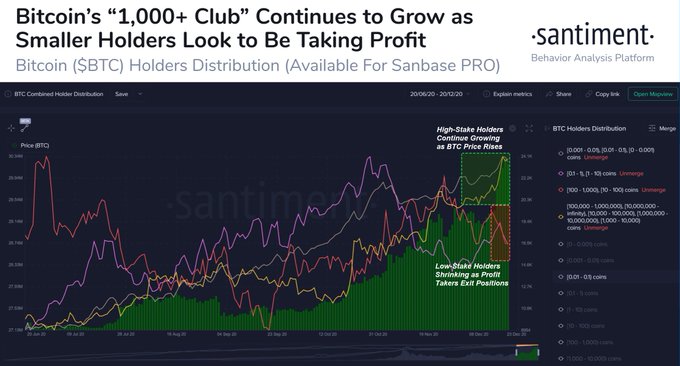What you should know about Bitcoin’s growing 1000+ club
Bitcoin’s improving valuation is currently being matched by the scale of activity in the market. Multiple metrics are indicating change and there is a sense of urgency in the digital asset industry. While every part of Bitcoin’s landscape seems positive at the moment, it is becoming a little tricky to evaluate implications that may manifest over the long-term following the bull-run.
A recent finding from Santiment highlighted a surging metric, one that is currently unclear with respect to its future connotations.

Source: Twitter
According to the analytics platform, the number of Bitcoin holders with 1000 or more BTCs has continued to rise, even after the price surpassed its previous all-time high. At the same time, addresses with less than 1000 BTC appeared to decline as small hodlers were speculating on cashing their profits at the cryptocurrency’s current, higher-than-expected, levels.
While heavy accumulation within 1000+ BTC wallets may seem harmless at first glance, it might be more concentrated than we can possibly imagine.
Institutions absorbing a huge chunk of Bitcoin?
One of the major differences between the present bull run and 2017 is the outright involvement of major financial institutions. These organizations are accumulating Bitcoin with vigor and interest, and recent interest from Microstrategy might have set the ball rolling for other entrants.
Now, according to the attached chart, on the 6th of December, few entities held 4.20% of the BTC supply, adding up to 881,953 BTC. However, it is possible that the number has increased since then, climbing to close to 5-6%, at press time.
Here, the striking observation is the fact that each individual organization may have multiple addresses with 1000+ BTCs, as pictured in the chart above. This leads to a significant degree of control of Bitcoin in the hands of a few, and down the years, it may lead to unequal distribution.
Should the masses be worried?
Probably Not.
One fundamental characteristic of Bitcoin is that its supply can be calculated over the course of its history and unlike fiat currency, it has a limited cap. In that respect, Bitcoin has the highest Supply Equality Ratio of any crypto-asset.
It is the metric that compares the average income of the richest 20% of society to the poorest 20%. Instead of income, the SER looks at supply held by different accounts within a network. It compares the poorest accounts (the sum held by all accounts with a balance less than 0.00001% of the supply) against the richest accounts (the sum held by all the top 1% addresses).
Source: Coinmetrics
Another factor that might deter massive accumulation in the future is BTC’s price appreciation. After a few years, it will be impossible to hoard over large sums of Bitcoin as further scarcity will only improve its long-term value.
OhNoCrypto
via https://www.ohnocrypto.com
Biraajmaan Tamuly, @KhareemSudlow

